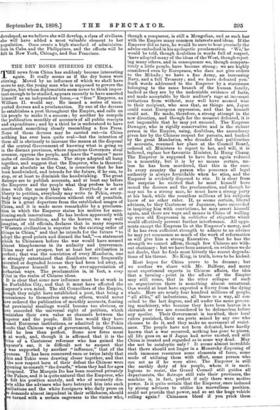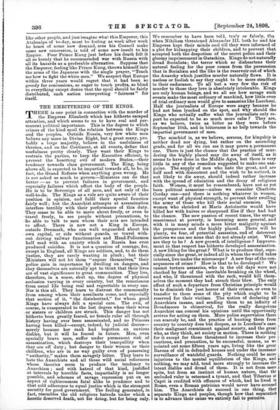THE DRY BONES STIRRING IN CHINA. T HE news from China
has suddenly become interesting again. It really seems as if the dry bones were stirring. Moved by an influence of which we shall have more to say, the young man who is supposed to govern the Empire, but whom diplomatists seem never to think impor- tant enough to be studied, appears recently to have asserted himself as an independent force,—a "free" Emperor, as William II. would say. He issued a series of unex- pected decrees and a proclamation. By one of the decrees he establishes a post throughout the Empire, and calls on his people to make it a success ; by another he compels the publication monthly of accounts of all public receipts and expenditure ; and by a third he is understood to have sanctioned something closely resembling a free Press. None of these decrees may be carried out—in China nothing has ever been quite real—but the intention of them all is obviously to increase the means at the disposal of the central Government of knowing what is going on in the distant provinces, where rapacious Governors steal revenue, oppress the people, and leave the " armies " mere mobs of coolies in uniform. The steps adopted all hang together, and suggest that the Emperor, who is theoreti- cally as absolute as the Czar, is conscious that he has been hoodwinked, and intends for the future, if he can, to stop, or at least to diminish the hoodwinking. The great Satraps are to publish accounts, and at least say before the Emperor and the people what they profess to have done with the money they take. Everybody is set at liberty to petition, everybody may write to Pekin, every- body may engage in discussion without risk of penalties. This is a great departure from the established usages of China, and it is made more remarkable by a proclama- tion in which the Emperor states his motive for sanc- tioning such innovations. He has broken apparently with conservative tradition, and to the horror, we may well magine, of old officials, declares that in many respects Western civilisation is superior to the existing order of hinge in China," and that he intends for the future "to dopt the good points and discard the bad,"—a statement hich to Chinamen before the war would have seemed • lmost blasphemous in its audacity and irreverence. hina may not prosper, but at least her civilisation is erfect; that was the conviction of every Mandarin, one o strongly entertained that dissidents were frequently xecuted or degraded because they had been led away, as e Emperor himself is now, by over-appreciation of arbarian ways. The proclamation is, in fact, a coup itat in the realm of Chinese ideas.
It is clear that some new influence must be at work in e Forbidden City, and that it must have affected the mperor's own mind. The old Councillors of the Empire, ough they might have established a post, that being a nvenience to themselves among others, would never ave ordered the publication of monthly accounts, fearing t provincial stealings would become too obvious, or ve conceded the universal right of petition, which minishes their own value as channels between the mperor and the people. Still less would they have aised European institutions, or admitted in the Pekin azette that Chinese ways of government, being Chinese, uld be less than perfect. Some new force must at work, and, though it is affirmed that it is the vice of a Cantonese reformer who has gained the peror's ear, it is difficult not to suspect that 'was supported by another "influence," that of the panese. It has been rumoured once or twice lately that kin and Tokio were drawing closer together, and that the new respect born of their defeat the Chinese were ginning to consult "the dwarfs," whom they had for ages despised. The Marquis Ito has been received privately the Palace, and it is quite natural that the Emperor, who felt his position acutely, and who of necessity dis- fits alike the advisers who have betrayed him into such miliatiens and the white foreigners who daily press on demands almost impudent in their selfishness, should ye turned with a certain eagerness to the visitor who, though a conqueror, is still a Mongolian, and as such hae with the Empire many common interests and ideas. If the Emperor did so turn, he would be sure to hear precisely the advice embodied in his apologetic proclamation. We,' he would be told, though doubtless in words full of respect, 'have adopted many of the ideas of the West, though reject. ing many others, and in consequence we, though compara- tively a little people, have become strong; we are highly considered even by Europeans, who dare not give orders to the Mikado ; we have a fine Army, an increasing Navy, and a full Treasury ; and we have defeated you.' Such words addressed to the Emperor by a statesman belonging to the same branch of the human family, backed as they are by the undeniable evidence of facts, and made acceptable by their auditor's rage at incessant irritations from without, may well have seemed wise to their recipient, who sees that, as things are, Japan could resist European oppression, and that he himself could not. He made, therefore, a strong attempt in the new direction, and though for the moment defeated, it is not impossible that he may yet succeed. The Empress Dowager, who is rigidly conservative and is the richest person in the Empire, using, doubtless, the ascendency given her by the Chinese respect for parents, and backed by the great Mandarins, who dreaded that publication of accounts, resumed her place at the Council Board, ordered all Ministers to report to her, and will, it is believed, replace her favourite Minister, Li Hung Chang. The Emperor is supposed to have been again reduced to a nonentity, but it is by no means certain, un- less he has been murdered, that this is the case. In every country the person who possesses all legal authority is always formidable when he stirs, and the Emperor is evidently disposed to stir. It is clear from the surprise he excited that he must himself have issued the decrees and the proclamation, and though he may not be a strong man, he must have a strong party at his back, while the countless millions of his subjects know of no other ruler. If, as seems certain, liberal advisers, be they Cantonese or Japanese, have succeeded in inspiring him with convictions, he may assert himself again, and there are ways and means in China of walling up even old Empresses in oubliettes of etiquette which would effectively prevent further interference. All oppo- nents except the Empress lie at the Emperor's mercy, and if he has even sufficient strength to adhere to an adviser he may yet commence so much of the work of reformation as will give him a strong Executive. That he has the strength we cannot affirm, though few Chinese are with- out obstinacy ; but we have been assured, on evidence we do not doubt, that he feels most bitterly the recent degrada- tions of his throne. No King, in truth, loves to be kicked.
Most hopes for China prove to be dreams ; but we confess we share with Mr. Balfour, and many most experienced experts in Chinese affairs, the idea that a turning - point in the affairs of the Empire• may still come, that in the utter collapse of such an organisation there is something almost unnatural. One would at least have expected a flurry from the dying whale. Here are nearly four hundred millions of people, "all alike," all industrious, all brave in a way, all con- ceited to the last degree, and all under the same govern- ing machinery, who because they have been beaten in a. skirmish or two are considered to be defenceless before any spoiler. Their Government is insulted, their local rulers punished, their sea ports seized by any one who chooses to do it, and they make no movement of resist. mice. The people have not been defeated, have hardly known that a war occurred, nothing has gone to pieces, all life goes on as if Japan had never existed, and still China is treated and regarded as in some way dead. May she not be cataleptic only ? It seems almost incredible that there should not linger in a Monarchy disposing of such immense resources some elements of force, some mode of utilising them with effect, some person who can act as if he were alive. The Emperor is still the earthly deity of his people, whom it is sacri- legious to resist, the Grand Council still guides all departments, the Satraps still rule their provinces, the machine is, in fact, perfect if only there were motive power. Is it quite certain that the Emperor, once induced by strong advisers to utilise his marvellous position, could not provide that power, and so set the huge vehicle rolling again ? Chinamen bleed if you prick them like other people, and just imagine what this Emperor, this Atahualpa of to-day, must be feeling as week after week he hears of some new demand, sees his Council make some new concession, is told of some new insult to his Empire. Poor Prince Kung just before his death felt it all so keenly that he recommended war with Russia with all its hazards as a preferable alternative. Suppose that the Emperor, feeling like Prince Kung, throws himself into the arms of the Japanese with the single prayer, " Teach me how to fight the white men." We suspect that Europe within three years would regret that it had been so greedy for concessions, so eager to touch profits, so blind to everything except desire that the spoil should be fairly distributed, each nation interpreting " fairness " for itself.







































 Previous page
Previous page